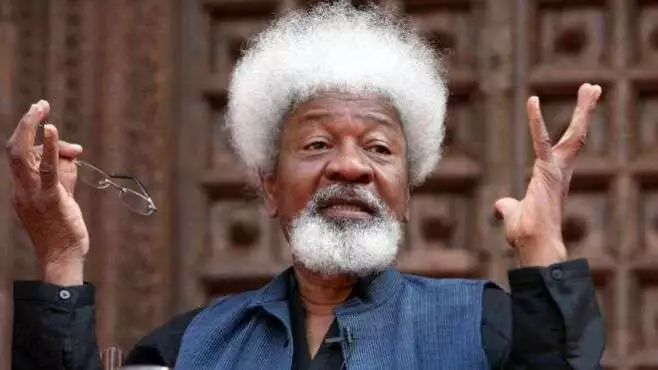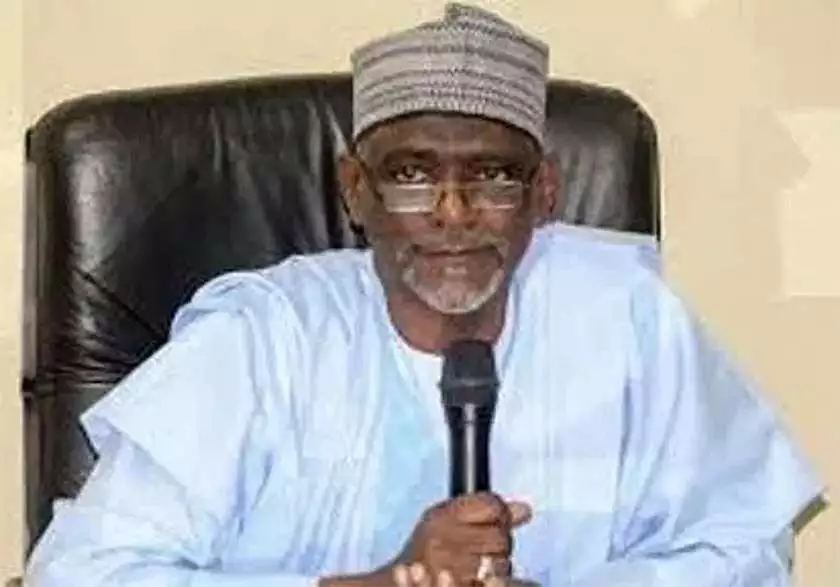Professor Wole Soyinka is not a coward. He neither runs away from a fight, nor controversy. He does not suffer fools gladly, either. He is known to have taken on every government in Nigeria – at the Federal level.
During the 2015 Presidential election, he shocked not a few people by lining up behind the eventual winner, then Geberal Muhammadu Buhari, against the incumbent President Goodluck Jonathan.
The shock stemmed from the fact that during Buhari’s first outing as Nigeria’s Head of State, Nobel Laureate Soyinka had no use for him. Autocrat, dictator, a human rights abuser, were some of his opinion of Buhari.
So, in 2015, what changed? Why did he back Buhari? Why did he get himself into a romance with him?
Some people say he did that in support of his friend, Chibuike Amaechi, Minister of Transport, and Asiwaju Bola Tinubu, APC National Leader. Both are known to be close to him.
But Soyinka, at the time, said he would back Buhari because he had been told the man who he previously held up as a dictator had become a democrat.
But things have since changed. A leopard does not change its spots. Soyinka has gone back to his familiar terrain, a terrain where he is most comfortable with. He has gone back to criticising President Buhari and his government at every drop of the hat.
At first, they ignored and endured him. But, the endurance seems to have boiled over. And the government seems to be gradually baring its fangs.
Nothing confirms this than the response to him by a Presidential Spokesman, Garba Shehu. President Buhari had, in a bid to stave off the spread of the pandemic Coronavirus, shut down the Federal Capital, Abuja, Lagos and Ogun states. But Soyinka had disagreed with the President, insisting he had no right to do so, especially, as Nigeria was not at war.
Conscious of the weight Soyinka’s words carry across the globe, the Presidency unleashed Garba to tackle him.
He did, in a stinging manner, which even hovered at mocking Soyinka. Garba reminded Soyinka that the business at hand was more serious than fiction-writing, and better left for Medical Doctors and Scientists. He asked Soyinka to wait, and write a fiction at the end of the crisis.
Soyinka’s response was to call Garba a Government propagandist.

The end then?
Hardly.
In the following strongly worded response, Adamu Adamu has taken Soyinka up as never before.
Not only did Adamu insist that Soyinka sees the Northern establishment as his adversary, he gives the impression that Soyinka has an exaggerated opinion of himself and superiority over others.
Here is Adamu in his own words:
“Professor Wole Soyinka, who appears totally ignorant of the most burning issue in international current affairs, betrays an unacceptable level of illiteracy on a related issue at home. On the issue of culpability for the origin of Boko Haram, Mahmud Jega says of Soyinka that he thinks he knows; Sam Nda-Isaiah says he doesn’t, and is hopelessly dead wrong; Mohammed Haruna says he only peddles pure rubbish. All the three are right, but the truth really is that he doesn’t even understand—and probably never will.
“This is because the tunnel vision with which he sees the country has been conditioned by three factors—an unfounded cultural superiority complex, a hubristic pagan worldview and an experience in which he saw the man died.
“The issue of Boko Haram merely gave him another opportunity to take on his imagined old adversary—the Northern Establishment, which he now holds responsible for the creation of Boko Haram. This is simplistic and laughable; but it saves this unready analyst the trouble of having to know the background to the situation, engage in serious analysis of the issues involved, draw the necessary conclusions and find a way forward for society.
“Certainly, a knowledge of the varieties of groups on the Islamic revival scene, which no one on the international scene should today be without, the fact that Boko Haram predated the Jonathan administration, and is confined to a corner of the country that is held by one of the opposition parties, and is opposed to all constituted authority including that to be wielded by the Northern leaders that were supposed to have founded it, would make Soyinka’s simplistic explanation all too obvious—and it might have been made to draw attention away from suspected US involvement.
“No doubt, Soyinka suffers from tribal hubris of which he needs to be cured. Going by the themes of his literary output, he seems to believe that his race is the greatest and the most cultured—and therefore, by implication, his pronouncements must be the best and the final word the world is waiting for.
“But what is this Yoruba culture in which people like Soyinka take so much pride? No doubt, his people love their language and love singing in it; they love their bodies and love waltzing them into a variety of dance forms. They love their lives and are always impulsively proud to say that they love the culture that has come to define the way they see themselves and view others.
“However, what Soyinka holds aloft is not culture: it is paganism; though it must be admitted that it is quite elaborate. But the possession of a pagan past is no accomplishment; it is a fact of history and every tribe has had one; and after the advent of Judaism, Christianity and Islam, there is nothing more to glory in animistic heathenism: it is there at the centre and origin of every type of primitiveness. The issue therefore should not be the promotion of the pagan culture of a distant past, but the cultivation of culturedness in present conduct.
“The proof and relevance of culture should be in its attitudinal pudding, measured by its practical moral utility in setting the standard of what is acceptable in human conduct; and not in the elaborateness of ancient idolatrous rituals.
“For us, it represented the sub-humanness of our primordial cultural history; and we are not proud of it, and nor are we any more captivated by its elaborateness or by the depth of meaning and the symbolism of its meta-paganism. Of course that is not to say that cultural mores are without meaning. Not at all. They may often in fact be too pregnant with a variety of meanings capable of interpretations; but their import is for a world that is past and gone—and better forgotten.
“Man’s cultural and social development have today passed the ignorance and obscurantism that paganism has to offer and the superficialities of the animus of those whose antipathy to divine values today finds expression in the cultivation and promotion of this new international pagan culture.
“But there is no superiority in paganism: there was nothing in Yoruba native forest theology that was more diabolical than the heathenism of the Savannah, where, in the Benue valley, there is magic that is blacker than Sanponno; and in Niger valley, a Satanism that is darker than Esu’s; and among the Maguzawa there are totems that, though benign, are no less occultist.
“The rituals of Tsumburbura were every inch as complex and elaborate as the possessed incantations of Ogun or the thunders of Sango, and no less diabolical. The Satanology of Santolo would beat every mumbo jumbo of Ifa Orisa divinations. The rites of Mai Barhaza would any day be more picturesque than the dance of the Egungun masquerade; and Babule and Dan Galadima more demonic than Ogboni totemism, and of women just as chauvinistic.
“In lasciviousness and pure voluptuary the Gelede Festival pales in comparison to the Dala Dance of unclothedness. In number, in hideousness of Satanism and in the comprehensiveness of misguidance Obatala’s 4,000-odd Orisas would prove no match for the fetishism and atheistic devilry of the numberless Iskoki of pre-Islamic Bahaushe. Or of the pre-Christian Tiv man, for instance. But all these are facts of which no one is today proud, or on account of which cultural superiority is assumed over others.
“Perhaps Soyinka’s—and Nigeria’s—problem lies in the fact that the Nobel Laureate considers himself an intellectual whose word the world looks forward to. And he is not. True intellectualism is not the mere fact of having been to school or teaching in one. It is all about being conscious, sensitive and aware of the circumstance and of one’s role in it and one’s readiness to sacrifice and suffer to make it better.
“You are either born an intellectual or you are not: it is an attitude that cannot be learnt; because education and experience only help to refine and sharpen an already existing predisposition—being analytical, being objective and being truly concerned. While some intellectuals choose only to expose a bad situation, others, in addition, fight to change it; and of these, those that succeed are those unencumbered by prejudice of the kind that Soyinka has always exhibited.
“It is not a quality that the receipt of an international prize—not even a Nobel—can confer on one; and a literary career based solely on the exploration of themes in Yoruba paganism is insufficient a social platform for someone like Soyinka, who is really not fully intellectualised, to articulate usefully on any of the many contentious national issues. That is why Soyinka is never known to have offered a solution that works; or that, when looked at closely, makes any sense. Of issues even within their areas of primary interest, they have no real knowledge—only fancy and conjecture and an overarching desire to belong to the cultural metropolis from which they unconsciously take their cue in spite of all the parroting of authentic Ogun-ness.
“Nigeria has changed from the closed society of 1964, but those unable to see, or are averse to seeing, healthy change in the nation have decided to cling to the uncreative fiction of the Wetie. And the fact that he is not understood—in his literature and in his analyses—and is therefore not generally effective shouldn’t mean that he doesn’t belong to that distinguished class of tribal jingoists and sectional propagandists; because even if his analysis is not clear—and is probably not even an analysis—his objective is always only too obvious, not least because, as far as the North is concerned, what he bandies about as analysis of its condition and role has remained unchanging over all these years.
“Three decades and someone has still not grown culturally or developed intellectually; and what a coincidence that Boko Haram also originated in Bo-ro-no State! Someone like him who has chosen the narrowness of a pagan worldview and eschewed the universalism of divine guidance or even that offered by objective secular multiculturalism will never taste the sweetness of true intellectualism. With a mind fixated on hatred and all muddled up with an incurable anti-Northern animus, it has become permanently set and is now a part of character, but too superficial and too ossified to be of any intellectual use.
“In our situation, it is not those who do not know who are lost, it is those who do not want to learn who are; and all those pretentiously bookish creatures whose knowledge is only from books are in reality ignorant even of them. Of this and of Boko Haram, he doesn’t really understand—and probably never will.”
Discover more from The Source
Subscribe to get the latest posts sent to your email.








